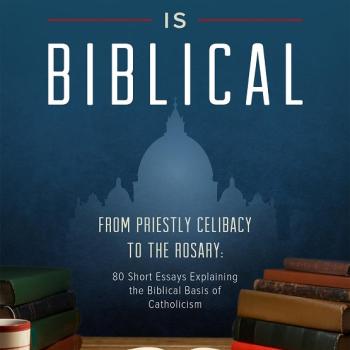It Never Was Definitive Teaching

Photograph by “tpsdave” (Nov. 2016) [Pixabay / CC0 public domain]
***
(12-28-07)
***
Many Catholics seem to be under the impression that the notion of limbo was some sort of formulated doctrine in the Catholic Church. Lots of children in Catholic schools were taught that all unbaptized children would not enter heaven. The fact of the matter is that it has always been left open as an option to be believed, but not required. Nor is the “hope of salvation” in such cases a “new thing.” Limbo has historically been, however, a widespread Catholic explanation concerning the fate of unbaptized dead; especially children.
Recently, there was a big tadoo about Pope Benedict XVI and Vatican theologians discussing the issue of limbo and, in effect, demoting its prominence in the overall structure of Catholic theology and dogma. Secular news reports have implied that this development in theology is somehow a radically “new” occurrence, as if the thought behind the present prevailing point of view has not also been mulled over for centuries.
Fr. John A. Hardon, S. J., wrote:
Some theologians of renown have thought that God might supply the wont of Baptism by some other means. St. Bernard, for example, suggested that infants who died without Baptism could reach heaven because of the faith of their parents. The Catechism of the Catholic Church does not deny the possibility or the existence of limbo. It merely says we may trust that, in God’s mercy, innocent children, whether born or unborn, do reach heaven. To be noted, however, is that we may trust, but without being certain of their entering the beatific vision.
See the following news reports and articles:
Pope Benedict XVI’s New Statement on Limbo (+ lively discussion thread) (RomanCatholicBlog.com)
Fr. Paul McPartlan’s explanations on ABC National Radio
Notion of Limbo Isn’t Closed, Expert Says (Zenit: Sister Sara Butler)
What does the Church teach about limbo? (CUF)
Unbaptized Infants (St. Thomas Aquinas’ position)
This current “trend” or prevailing opinion is not anything new. The present consensus may be relatively new, but the reasoning behind it is not at all. For example, from Ludwig Ott, Fundamentals of Catholic Dogma:
Other emergency means of baptism for children dying without sacramental baptism, such as prayer and the desire of the parents or the Church (vicarious baptism of desire – Cajetan), or the attainment of the use of reason in the moment of death, so that the dying child can decide for or against God (baptism of desire – H. Klee), or suffering and death of the child as quasi-Sacrament (baptism of suffering – H. Schell), are indeed possible, but their actuality cannot be proved from Revelation. Cf. D 712.” (p. 114)
Ott noted on p. 357:
Baptism of desire works ex opere operantis. It bestows Sanctifying Grace, which remits original sin, all actual sins, and the eternal punishments for sins.
Ott states that the baptism by blood (even for young children; cf. The Feast of the Innocents) “confers the grace of justification”. He classifies these “substitutes for sacramental baptism” as sententia fidei proxima, or a “teaching proximate to Faith”; as he explains: “a doctrine, which is regarded by theologians generally as a truth of Revelation, but which has not yet been finally promulgated as such by the Church.” (p. 9) So it would appear that these teachings are as authoritative in a “non-defined” sense, as limbo ever was.
The Council of Trent referred to the baptism of desire, in the canons concerning “On the Sacraments in General”, right before the canons on baptism, from Session VII; Canon IV:
If any one saith, that the sacraments of the New Law are not necessary unto salvation, but superfluous; and that, without them, or without the desire thereof, men obtain of God, through faith alone, the grace of justification;-though all (the sacraments) are not indeed necessary for every individual; let him be anathema.
In Summa Theologica: Third Part, Question 68, Article 2, St. Thomas Aquinas (citing St. Augustine) espouses the baptism of desire:
Whether a man can be saved without Baptism? Objection 1. It seems that no man can be saved without Baptism. For our Lord said (John 3:5): “Unless a man be born again of water and the Holy Ghost, he cannot enter the kingdom of God.” But those alone are saved who enter God’s kingdom. Therefore none can be saved without Baptism, by which a man is born again of water and the Holy Ghost.
Objection 2. Further, in the book De Eccl. Dogm. xli, it is written: “We believe that no catechumen, though he die in his good works, will have eternal life, except he suffer martyrdom, which contains all the sacramental virtue of Baptism.” But if it were possible for anyone to be saved without Baptism, this would be the case specially with catechumens who are credited with good works, for they seem to have the “faith that worketh by charity” (Gal. 5:6). Therefore it seems that none can be saved without Baptism.
Objection 3. Further, as stated above (1; 65, 4), the sacrament of Baptism is necessary for salvation. Now that is necessary “without which something cannot be” (Metaph. v). Therefore it seems that none can obtain salvation without Baptism.
On the contrary, Augustine says (Super Levit. lxxxiv) that “some have received the invisible sanctification without visible sacraments, and to their profit; but though it is possible to have the visible sanctification, consisting in a visible sacrament, without the invisible sanctification, it will be to no profit.” Since, therefore, the sacrament of Baptism pertains to the visible sanctification, it seems that a man can obtain salvation without the sacrament of Baptism, by means of the invisible sanctification.
I answer that, The sacrament or Baptism may be wanting to someone in two ways. First, both in reality and in desire; as is the case with those who neither are baptized, nor wished to be baptized: which clearly indicates contempt of the sacrament, in regard to those who have the use of the free-will. Consequently those to whom Baptism is wanting thus, cannot obtain salvation: since neither sacramentally nor mentally are they incorporated in Christ, through Whom alone can salvation be obtained.
Secondly, the sacrament of Baptism may be wanting to anyone in reality but not in desire: for instance, when a man wishes to be baptized, but by some ill-chance he is forestalled by death before receiving Baptism. And such a man can obtain salvation without being actually baptized, on account of his desire for Baptism, which desire is the outcome of “faith that worketh by charity,” whereby God, Whose power is not tied to visible sacraments, sanctifies man inwardly. Hence Ambrose says of Valentinian, who died while yet a catechumen: “I lost him whom I was to regenerate: but he did not lose the grace he prayed for.”
Reply to Objection 1. As it is written (1 Kgs. 16:7), “man seeth those things that appear, but the Lord beholdeth the heart.” Now a man who desires to be “born again of water and the Holy Ghost” by Baptism, is regenerated in heart though not in body. thus the Apostle says (Rm. 2:29) that “the circumcision is that of the heart, in the spirit, not in the letter; whose praise is not of men but of God.”
Reply to Objection 2. No man obtains eternal life unless he be free from all guilt and debt of punishment. Now this plenary absolution is given when a man receives Baptism, or suffers martyrdom: for which reason is it stated that martyrdom “contains all the sacramental virtue of Baptism,” i.e. as to the full deliverance from guilt and punishment. Suppose, therefore, a catechumen to have the desire for Baptism (else he could not be said to die in his good works, which cannot be without “faith that worketh by charity”), such a one, were he to die, would not forthwith come to eternal life, but would suffer punishment for his past sins, “but he himself shall be saved, yet so as by fire” as is stated 1 Cor. 3:15.
Reply to Objection 3. The sacrament of Baptism is said to be necessary for salvation in so far as man cannot be saved without, at least, Baptism of desire; “which, with God, counts for the deed” (Augustine, Enarr. in Ps. 57).
From this it follows that an infant can be saved by baptism of desire, vicariously, just as it is saved by baptism by water vicariously, since the infant is not exercising its own desire in either case. St. Thomas Aquinas also espouses baptism of blood in the Summa, 3a, 66, 12.
A symposium was held and summarized in a book called Abortion and Martyrdom (edited by Aidan Nichols):
The lowest common denominator position is represented in the following resolution of the symposium: “Given the morally unanimous opinion of the Fathers of the Church, of St Thomas Aquinas, of the teaching of the ordinary Magisterium and of the witness of the Sacred Liturgy that infants can be martyrs, and that the Baptism of blood avails for justification, the Church can declare in individual cases, based on reliable testimony, that infants, even unborn, who are killed on account of an explicit hatred of the Christian faith or of the other virtues of the Christian life, are in fact holy martyrs and may be invoked and venerated as such by all the faithful.”
Therefore, the “hope of salvation” in such cases, is not at all “an innovation”, as some claim. It goes back to the Fathers, through Aquinas and Trent. It’s nothing new. That’s why Pope Benedict XVI noted in The Ratzinger Report: “the very theologians who proposed ‘limbo’ also said that parents could spare the child limbo by desiring its baptism and through prayer” (p. 148).
Just as in the issue of salvation outside the Church, there are concurrent traditions that run side-by-side in the history of theology, emphasizing different aspects of the topic. In the same way, the baptism of desire / baptism by blood strain of thought has been present from early on, alongside the limbo interpretation of non-baptism situations. In any event it is not an “innovation” to think this, which is precisely how Pope Benedict XVI was able to speak more authoritatively against limbo as any sort of required (or even recommended belief), because he could draw on this other tradition.
As an example of the “older” way of thinking, observe, for example, the Catholic Encyclopedia article on limbo. It states:
The New Testament contains no definite statement of a positive kind regarding the lot of those who die in original sin without being burdened with grievous personal guilt. But, by insisting on the absolute necessity of being “born again of water and the Holy Ghost” (John 3:5) for entry into the kingdom of Heaven (see BAPTISM, subtitle Necessity of Baptism), Christ clearly enough implies that men are born into this world in a state of sin, and St. Paul’s teaching to the same effect is quite explicit (Romans 5:12 sqq.). On the other hand, it is clear from Scripture and Catholic tradition that the means of regeneration provided for this life do not remain available after death, so that those dying unregenerate are eternally excluded from the supernatural happiness of the beatific vision (John 9:4, Luke 12:40, 16:19 sqq., 2 Corinthians 5:10; see also APOCATASTASIS). The question therefore arises as to what, in the absence of a clear positive revelation on the subject, we ought in conformity with Catholic principles to believe regarding the eternal lot of such persons. Now it may confidently be said that, as the result of centuries of speculation on the subject, we ought to believe that these souls enjoy and will eternally enjoy a state of perfect natural happiness; and this is what Catholics usually mean when they speak of the limbus infantium, the “children’s limbo.”
Notice, however, some of the distinctions made here. First it says there is no definitive, “positive” New Testament evidence, This is crucial, and is probably the main reason why it has never been defined once and for all, because the subject is necessarily speculative, beyond public revelation.
What is stated to be clear is not limbo itself, but the related notion that no regeneration occurs after death. But that is exactly what is taken into consideration in the concepts of baptism of desire and of blood. In those cases, regeneration or justification occur before death, thus allowing the soul to avoid the conjectural limbo. Therefore, this is not “definitive” language at all; nor does it resolve the question of limbo.
When the article gets back on the question of limbo, directly, note that it is way more tentative: “. . . it may confidently be said that, as the result of centuries of speculation on the subject, we ought to believe . . .”
This is not the language of definitiveness. It was always a theological speculation, and that is why and how it can be “demoted” now. I’m glad to see it. I never resonated very much with the doctrine of limbo, myself. I thought that God’s mercy would trump it in the end. It is always good to discover that the Mind of the Church coincides with one’s own theological / spiritual “instinct”. I would submit to the Church’s understanding in any case (I want to make that clear). But there are times when one mulls over opinions on his own and then discovers that the Mind of the Church came to the same conclusion. This is a blessing and a confirmation of being led by the Spirit into all truth.













